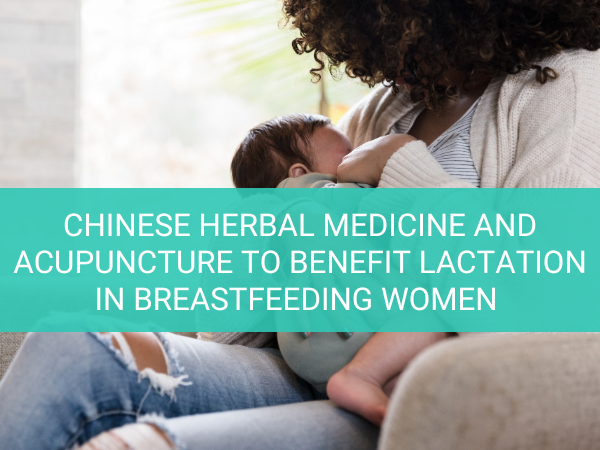Chinese herbal medicine and acupuncture for breastfeeding have been used in tandem to improve lactation for breastfeeding women and help support optimal health in new mothers. Chinese medicine practitioners have paired medicinal herbs and acupuncture together for thousands of years, making them a proven combination for women who are nursing or women entering the later stages of pregnancy.
How Can Chinese Herbal Medicine and Acupuncture Help Breastfeeding Women?
Chinese medicine practitioners recognize two lactation-related disorders in breastfeeding women – insufficient milk production and insufficient milk expression. Here is how Chinese medicine addresses both issues:
- Insufficient breast milk production – There are many potential reasons why breastfeeding women may have trouble producing enough breast milk for their newborn, but they generally point to the same issue – a lack of Qi
In Chinese medicine, Qi is the essential life energy that supports organ function and overall health. During pregnancy, Qi levels are depleted in the process of nourishing the developing child. For challenging pregnancies or in women whose Qi levels are already diminished, this can leave the body too weak for lactation. Practitioners also monitor the patient’s blood supply, as it is also strained during pregnancy and delivery, and this can interfere with lactation as well.
Breast milk deficiency can be treated with a combination of acupuncture and Chinese herbal medicines. Medicinal herbs are effective for supporting lactation because they tonify the Qi and blood, which improves the way Qi flows through the body and improves the nutritive quality of the blood. A variety of herbs including turmeric, mint, barley, anise, dandelion, musk mallow, vaccaria, and sesame are used to boost lactation in this way.
Acupuncture may also have positive effects on breast milk supply. According to research published by a team at the Hanzhong Shanxi Hospital in central China, breastfeeding women who received acupuncture at the proper acupuncture points reported a significant increase in milk production and volume. The researchers also found that the women had higher serum levels of prolactin, a hormone responsible for stimulating lactation.
- Insufficient milk expression – In some breastfeeding women who have lactation issues, the problem isn’t producing enough milk. The problem is transporting the milk through the milk ducts and to the nipples where it is expressed. Chinese medicine practitioners attribute this condition to Qi “stagnation,” or disruptions in Qi flows that result in blockages. This can manifest as poor milk expression and flow. Additional symptoms may include breast pain, tenderness, fullness and breast distension.
Acupuncture is well-suited for disorders caused by Qi stagnation. When acupuncture needles are inserted into the skin, they stimulate the nervous system, improving communication between the brain and local nerve tissue. There are numerous positive effects associated with this improved neurological signaling – better Qi flows and removing blockages are among them.
Acupuncture Can Also Help Breastfeeding Women with Stress and Depression
Western and Chinese medicine physicians recognize a link between lactation and the mother’s emotional state. Emotional distress is associated with reduced breast milk production and poses many other challenges to the mother.
However, acupuncture treatments may work to alleviate this stress and improve the mental side of breastfeeding. Here’s how:
- Acupuncture stimulates a relaxation response – Acupuncture needles directly interface with the body’s neurological system, stimulating local nerves and creating a cascade of effects that involve the brain. Among those effects is stimulating the parasympathetic nervous system – the part of the nervous systems that drives the body’s relaxation response. The parasympathetic system controls heart rate, respiratory rate, and other markers of stress. By engaging this system, acupuncture triggers the physiological effects that lead to stress reduction.
- Acupuncture helps restore ideal hormone levels – Hormonal imbalances can lead to an array of health problems, including poorly managed stress. However, a number of research studies show that acupuncture can restore some of these hormone imbalances by promoting better communication between organs (such as those on the hypothalamus-pituitary-adrenal axis) and, by extension, better homeostasis. This can improve a breastfeeding mother’s resistance to stress and ability to manage it.
- Acupuncture gives mom a much-needed time out – Acupuncture’s stress-relieving effects have a physiological explanation, but there are psychological factors at work as well. Acupuncture sessions are designed to be relaxing and comfortable. Treatment is performed in a quiet room, and experienced acupuncturists know how to insert acupuncture needles with minimal discomfort.
Unsurprisingly, many breastfeeding women report feeling relaxed during and following their acupuncture treatment. Research into acupuncture’s efficacy in anxiety and depression shows that these effects may persist for weeks following treatment. For breastfeeding mothers, a weekly respite from the day-to-day may be the mental boost needed to improve lactation results.
Chinese Herbal Medicine and Acupuncture Can Benefit Breastfeeding
When lactation is a problem for breastfeeding women – either due to poor supply or poor flow – Chinese medicine may provide help. Medicinal herbs and acupuncture both have proven effects in improving the supply of breast milk and encouraging better flow, for example.
An experienced Chinese medicine practitioner will use best treatment and sanitation practices to maximize safety and efficacy. And if your practitioner is also board certified in western medicine, they will have a variety of therapies to help breastfeeding women with lactation.

